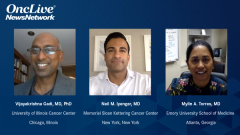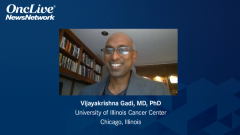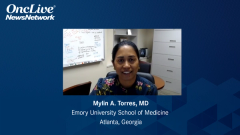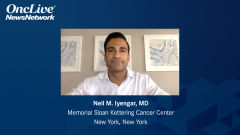
The HER2+ MBC Treatment Pipeline
Exciting therapeutic strategies in the HER2-positive metastatic breast cancer space that demonstrate potential in addressing gaps in treatment.
Episodes in this series

Vijayakrishna Gadi, MD, PhD: Let’s start wrapping this up by offering some closing thoughts and what you’re looking forward to in the HER2-positive space in the coming months to years. Mylin, I’ll start with you.
Mylin A. Torres, MD: As a radiation oncologist, I think our whole field is very interested in how we interlace radiation with a lot of the new drugs coming out in breast cancer, particularly in the HER2 space. At ASTRO [2021 American Society for Radiation Oncology annual meeting], Jennifer Bellon, [MD,] presented a review from a study looking at the combination of when radiation is given with T-DM1 [trastuzumab emtansine] and essentially showed that there wasn’t increased toxicity by using those 2 together in patients with nonmetastatic breast cancer. That’s very exciting and potentially very clinically applicable. We have a lot of work to do from a radiation oncology standpoint in that area, but I’m very excited to see what the future holds. Neil, what about you?
Neil M. Iyengar, MD: There are certainly some areas of need that are being addressed in ongoing clinical trials. In the first-line setting, I’m looking forward to improving the quality of life and toxicity of our standard therapy approach. A taxane is toxic. If we can spare some of that toxicity and perhaps bring up some of these agents being tested in the first line that are potentially less toxic, that’s very exciting to me.
The other piece that’s exciting to me is that even though it seems like we have a fire hose of data, this is still the tip of the iceberg. There are still a lot of novel agents coming down the pipeline, including bispecific antibodies and immunotherapy combinations. For example, what do we do in the maintenance phase in the first line when patients are just on antibody therapy? Can we combine it with hormone plus molecular therapy? These are all things that are being addressed in clinical trials right now, and our practice is going to continue to change in a very exciting way. The final thing I’ll say is that we have to keep in mind that patients with leptomeningeal disease were excluded from the trials we’ve discussed today. That’s still a huge area of need.
Vijayakrishna Gadi, MD, PhD: Yes, I completely concur with everything that you guys said in terms of what we’re looking forward to. I really like the idea of thinking out of the box and combining radiation therapy and other approaches with the standard toolbox that we’re using. I’ve often said that I got into this to put ourselves out of business. With HER2-positive disease, we’re inching realistically toward that. I hope very few patients will get to a point where they get diagnosed with early stage disease and end up with metastatic disease.
Of course, there are still going to be patients who get diagnosed with metastatic disease. When progression events happen, right now our thought process is, “We’re going to take these data, we’re going to go with this, we’re going to go to this.” But a lot of that decision-making isn’t molecularly driven. We’re going to get to a point where as we begin to do the genomics expression, all these analyses, maybe we can get more bespoke for what we’re doing for an individual patient to say, “Out of this tool chest of things, this makes the most sense given what’s going on in this cancer,” as opposed to an NCCN [National Comprehensive Cancer Network] guideline that just says, “Here’s what you do first, here’s what you do second.” That’s where we are. We’re getting close. I’m optimistic. There are lots of cool ideas out there, including immunotherapy and cell therapy, and we’re getting smarter about how we think about these cancers.
With that, I hope this was an invigorating discussion for everybody listening in, and hopefully this is something you can translate into your practice. I know for myself, but I also suspect for Dr Iyengar and Dr Torres, any time you need us, come find us. We’re happy to lend our voices to whatever you’re thinking. Thank you so much.
Transcript edited for clarity.





































